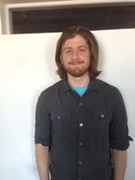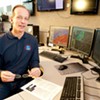2011 photo of J. Craig Venter from Wikimedia Commons
For J. Craig Venter, the sky isn't the limit, but Mars might be. The 67-year-old biologist and entrepeneur first mapped the human genome in the late 1990s using a technique he invented and called "shotgun sequencing." A decade later, in 2010, one of his organizations, Synthetic Genomics, became the first to develop "synthetic life," essentially fabricating a strand of DNA that contained the entire genome of a bacteria cell.
Now, as Venter writes about in his new book, Life at the Speed of Light: From the Double Helix to the Dawn of Digital Life, his organization is researching potential applications for the fledgling field of synthetic biology. They range from straightforward to totally outlandish: crafting better vaccines or more efficient sources of nutrition; cleaning water and air; and equipping NASA's Mars Curiosity Rover with DNA-sequencing techology that could digitally map Martian genomes and beam them back to Earth for re-creation in labs.
It wouldn't be the first time Venter has looked beyond Earth to solve our scientific riddles. For the last six years, he and other scientists have crisscrossed 80,000 miles of sea in his private yacht, the Sorcerer II. That project, known as the Global Ocean Sampling Expedition, has led to the discovery of hundreds of new species of microbes, as well as millions of genetic base pairs and a couple thousand new families of proteins.
Venter will speak about his new book at Norwich University on Monday, February 3 (details below). In advance of that lecture, we spoke with him by phone about a few of his accomplishments, as well the state of science in the U.S.
SEVEN DAYS: Since developing the first synthetic cell in 2010, you’ve said that a “vision is being borne out” for how this technology can help us create better vaccines, biofuels, cleaner water, more abundant sources of food, etc. Where do you see that vision being borne out now, and what are some developments we could feasibly see in the next five years?
J. CRAIG VENTER: Well, those are all areas that we’re actively working in at Synthetic Genomics, and it’s not clear yet where the fastest applications will be. But I think the vaccine area might be one of them, certainly based on immediate needs. New flu strains are emerging in China and other places, and the number of deaths from flu are starting to mount in the U.S., so I think it’s all very critical for new developments.
SD: How has the Global Ocean Sampling Expedition been an extension of the work you did on the human genome, and how has it informed your work since?
JCV: The technology we used to sequence the human genome was based on what we did sequencing the first genome in 1995. We applied that to both the human gut, with the first paper on what’s now called the microbiome, and for the environment, what’s called the environmental genomic field.
It all developed out of that same technology of using sequencing as the assay to find out what’s in the environment, versus in the past, scientists — for example, marine biologists — measured things only by what they could grow in the laboratory, and therefore missed about 99 percent of what was in the environment.
SD: There’s much ado about the decline of math and science education in the U.S. right now. Do you agree with the doom and gloom, or are there glimmers of hope in the growing popularity of things like hackathons and maker fairs?
JCV: That’s a good question. There’s almost two different worlds: There’s the world that seems to think higher education is not such a good thing. It’s even an anti-intellectualism in parts of the country — certainly some of it originating with Tea Party kind of thinking — would be the shortest explanation.
On the other hand, I’m also optimistic about areas where education is recognized for the critical value for the future that it is. Young people are very excited by this new field of synthetic biology and synthetic genomics, 3D printing and all the different aspects of it, because they actually grew up in the digital world, a very different world than most people over 30 have grown up in. There seems to be real excitement in the potential of these new areas of science for solving key problems facing humanity, so there’s good and bad news on both sides.
When things get tough, people resort to fundamentalism and religion and other areas. At the same time, the whole future of the U.S economy and the future of the U.S. as a successful nation is going to be based on new science, new scientific breakthroughs, leading to new industries and new products, new treatments for disease, etc. Without those, many people publish books on how entire nations are lost in a single generation. You don’t inherit your knowledge. Each generation has to learn it from scratch, so whole nations, whole civilizations can be lost in a single generation by avoiding building for the future. In the case of humanity, the future is totally dependent on science.
SD: For a kid interested in science, what’s your advice?
JCV: In these days, there’s no wrong field to work in. The area we work in is based on math breakthroughs, basic biology breakthroughs, computer breakthroughs, philosophic breakthroughs, so there’s no wrong area for training. The most important thing is to get real-world experience. I always tell people to follow their passions. The education system, even the best education systems, do not provide a broad introduction to all the things that are out in the world, so the only way to find out is to do internships and jobs where you get exposed to far more than you would in the education system.
J. Craig Venter will speak about his new book, Life at the Speed of Light: From the Double Helix to the Dawn of Digital Life, on Monday, February 3, 7 p.m., in Plumley Auditorium, Norwich University, in Northfield. Books will be available for sale, and a signing will follow the lecture.















































